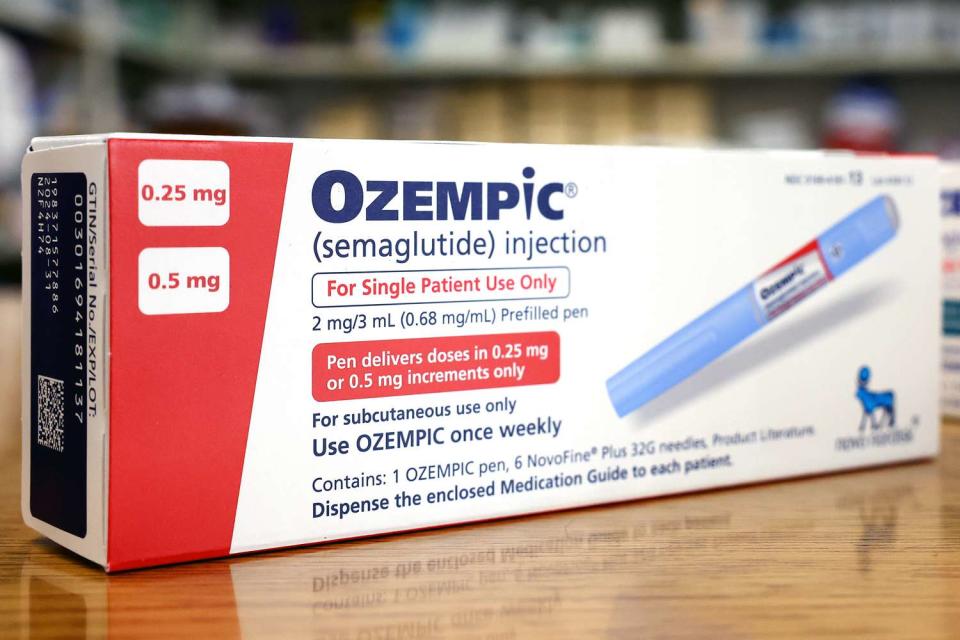Ozempic FAQ: All About the Drug Being Used for Weight Loss — Yes, You Will Likely Gain Weight When You Stop Taking It
Here’s what to know about type 2 diabetes drug Ozempic, which has skyrocketed in popularity for casual weight loss

Mario Tama/Getty
OzempicThroughout the past year, Ozempic has skyrocketed in popularity in Hollywood and beyond as more and more people turn to the drug for for casual weight loss.
As the controversial medication continues to trend, here’s everything to know about the diabetes-turned-weight loss drug.
What is Ozempic?
Ozempic is an FDA-approved prescription medication for people with type 2 diabetes. It's one of the brand names for semaglutide and tirzepatide — also known as Wegovy and Mounjaro.
How does Ozempic work?
“They work in the brain,” Ania Jastreboff, M.D., PhD., an obesity medicine physician scientist at Yale University, tells PEOPLE of these drugs that satiate users. “Semaglutide and other medications in this class are nutrient-stimulated, hormone-based medications.”
“These medications are working in a way to mimic those hormones that are released from our intestine and our pancreas when we eat, then impact different tissues in our body,” she explained. “One of the targets is the brain. So, they work in the brain to impact satiety. So, what happens is when patients take these medications, they feel more full earlier, especially during the weight-reduction phase.”
Is Ozempic different from Wegovy?
Ozempic and Wegovy are both brand names for semaglutide. Ozempic is branded as the treatment of type 2 diabetes and Wegovy is branded as the treatment of obesity.
“Semaglutide Ozempic for diabetes goes up to a dose of two milligrams once-weekly, and semaglutide Wegovy for obesity goes up to a once-weekly dose of 2.4 milligrams,” Jastreboff notes.
Related: Nurse Who Took Ozempic for COVID Weight Gain Reveals What Happened After Stopping the Medication

Getty
Ozempic injectorHow do you get Ozempic?
Ozempic, or similar drugs, can be prescribed by a doctor to help manage type 2 diabetes or chronic obesity. There are also some telehealth companies that can prescribe the medication following patient consultations.
There are, however, many people without type 2 diabetes or chronic obesity who are getting Ozempic through off-label prescribing for weight loss. Off-label prescribing is when a physician provides a medication that the FDA has approved to treat a condition different from the patient’s condition.
How much does Ozempic cost?
There are currently no generic forms of Ozempic and the average retail cost without insurance can range from $1,205 to $1,368.
What are the side effects of Ozempic?
Taken once a week by injection in the thigh, stomach or arm, Ozempic comes with common side effects like nausea and diarrhea, and sometimes vomiting or constipation, Jastreboff says.
“It's very important to always start at the lowest dose when you're starting these medications and to go up slowly. If the medication is increased too quickly, then these side effects are more likely to occur,” she added. “We also know that a majority of the side effects occur during that dose escalation phase.”
The FDA has also updated the warning label for Ozempic, saying it has potential to cause a life-threatening condition known as ileus — a type of bowel obstruction where either sections or the entirety of the intestines become obstructed. This blockage can restrict blood flow to organs, resulting in tissue necrosis.
There have also been reports of Ozempic being linked to suicide.
In July, the European Medicines Agency (EMA) expanded its investigation of Ozempic’s manufacturer Novo Nordisk, after "150 reports of possible cases of self-injury and suicidal thoughts."
However, Novo Nordisk said in a statement, “The totality of available evidence — which includes clinical studies and data from real world-use — does not suggest an increased risk of suicide or self-injurious behavior with Ozempic. In completed Ozempic clinical studies, no events of suicide or self-injury were reported in patients treated with Ozempic."
Related: Texas Mom Shares Experience Using Ozempic for 1 Year: 'It's More Complicated Than People Realize'
How much weight will I lose weight on Ozempic?
It is normal to eventually see a weight loss plateau with long-term use of Ozempic. This plateau can occur when the body loses too much fat and muscle simultaneously, causing the metabolism — and weight loss — to slow. But, experts say it should be expected, as it would be dangerous to continue losing weight.
What happens when you stop taking Ozempic?
A study in the Journal of Pharmacology and Therapeutics found that a majority of people who take semaglutide gain most of the weight back within a year of stopping the medication, which can be difficult to control.
Jastreboff also told PEOPLE that because drugs like Ozempic and Wegovy are intended for type 2 diabetes and obesity — which are chronic conditions — they aren’t meant to be stopped.
"If you have a patient who has high blood pressure, they have hypertension, and you start them on an antihypertensive medication, and their blood pressure improves, what would happen if you stopped that medication? Well, their blood pressure would go back up — and we're not surprised. It's the same with anti-obesity medications," she explained, adding that the drugs are not tested for people who do not have type 2 diabetes or chronic obesity.
Which celebrities have taken Ozempic?
Sharon Osbourne, Tracy Morgan, Chelsea Handler, Dolores Catania, Golnesa "GG" Gharachedaghi, Claudia Oshry, Lauren Manzo, and more have publicly discussed their experiences taking Ozempic or similar drugs.
In addition, many other celebrities have expressed concern about using the medication as a trendy weight loss aid.
"The Hollywood trend is concerning," Dr. Caroline Apovian, co-director of the Center for Weight Management and Wellness at the Brigham and Women's Hospital in Boston, told PEOPLE. "We're not talking about stars who need to lose 10 lbs. We're talking about people who are dying of obesity, are going to die of obesity."
For more People news, make sure to sign up for our newsletter!
Read the original article on People.


